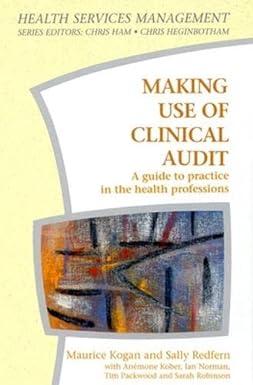Question
The supplemental materials describe the process of calculating WACC and go on to apply the results to valuing a firm both unlevered (no debt) and
The supplemental materials describe the process of calculating WACC and go on to apply the results to valuing a firm both unlevered (no debt) and levered (debt).
The levered firm is shown to be more valuable. These are two identical firms, yet the firm with the debt is more highly valued. Does this make sense? Why or why not? Why not use 100% debt financing if debt increases value?
Suplementails materials:
A project (or firm) will be financed through a combination of equity and debt.
Q: What is equity?
Q: What is debt?
The value of a firm or project can be thought of as:
V = B + S.(eq.1)
Where V = value, B = market value of debt, S = market value of equity.
(Recall if firms obtain debt financing in the financial markets, they issue bondshence the B for debt, you could also have loans, etc.)
Example: You start a project. You and your classmates invest $1,000,000 ($1M) of your own funds into the project and you obtain $9,000,000 ($9M) of debt financing (this mix of debt and equity is the capital structure).
Q: What is the value of the project?
V= $1M +$ 9M =$ 10M
Assume a nearly identical project across the street from yours sells for $15M the day after you arrange the financing above (this is a gross simplification for illustrative purposes).
Q: What is the value of debt? Equity? And total value? If the project is nearly identical than it appears the market is pricing the project at $15M, so V = $15M. Value of debt (B) is what?
Debt holders are the ones who have a claim against your project via interest paid on the loan. The bond/debt holders are the ones who can force you into bankruptcy and hold a higher priority of claim (they get paid first). Debt holders do not partake in the increase in the value of equity.
Therefore, the value of B is:
$ 9 m.
Who gets the increase in value? The equity holders. You and your classmates now have equity of $6M.
Does financing all have to come from external sources?
No, you can use retained earnings.
The use of the capital is not free; there is a cost (cost of capital). Do you go to the market to purchase groceries? Do people go to the financial markets to purchase capital? Is there a cost when you buy groceries? Do you think there is also a cost of capital? The answer is yes.
Step by Step Solution
There are 3 Steps involved in it
Step: 1

Get Instant Access to Expert-Tailored Solutions
See step-by-step solutions with expert insights and AI powered tools for academic success
Step: 2

Step: 3

Ace Your Homework with AI
Get the answers you need in no time with our AI-driven, step-by-step assistance
Get Started


